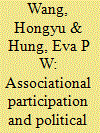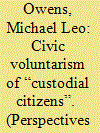|
|
|
Sort Order |
|
|
|
Items / Page
|
|
|
|
|
|
|
| Srl | Item |
| 1 |
ID:
114084


|
|
|
|
|
| Publication |
2012.
|
| Summary/Abstract |
Spatial distribution is an important dimension of research into the development of high technology (hi-tech) industries due to the knowledgeintensive features of these industries. This paper separates the agglomeration effects and the spillover effects, and analyzes the evolution of the spatial distribution of China's hi-tech sub-industries from themid-1990s by combining the geographic concentration index (locational Gini coefficient, concentration ratio) and spatial econometrics (Moran's I). The results reveal that, firstly, most hi-tech subindustries tend to be concentrated in the eastern coastal regions of China, while there are significant spillover effects from the eastern coastal regions to the central regions. The development model based on national hi-tech industrial zones is the primary reason for industrial agglomeration, and it is the result of both government direction andmarket rules. Secondly, on the macro-level, there has been a certain amount of geographical concentration and interregional division of labor among China's hi-tech industries, but there is low intraregional specialization. Furthermore, in contrast to the findings of most of previous studies, the distribution ofChina's hi-tech industries and that of its innovation capacity share similar evolutionary trends, although they do not completely overlap.
|
|
|
|
|
|
|
|
|
|
|
|
|
|
|
|
| 2 |
ID:
162661


|
|
|
|
|
| Summary/Abstract |
A growing body of research explores the influence of involuntary criminal justice contact on political participation, demonstrating that all types of contact weaken political participation. We posit, however, that personal connections to civil society organizations (CSOs) moderate the negative effects of involuntary criminal justice contact on political participation, particularly political activism beyond registering to vote and voting. We test this proposition with individual-level and aggregate-level data from metropolitan and municipal Chicago. Our findings confirm a paradox of participation by custodial citizens. One, we demonstrate positive, statistically significant, and substantive effects of personal connections to CSOs on nonvoting political participation by custodial citizens. Two, the negative effects of involuntary criminal justice contact on voting participation among individuals and communities may endure, despite personal connections to CSOs, even in a state where the franchise is restored immediately after incarceration. Our study suggests that an associational account of political participation deepens our understanding of the political behavior of custodial citizens and their communities in the age of mass incarceration.
|
|
|
|
|
|
|
|
|
|
|
|
|
|
|
|
|
|
|
|
|